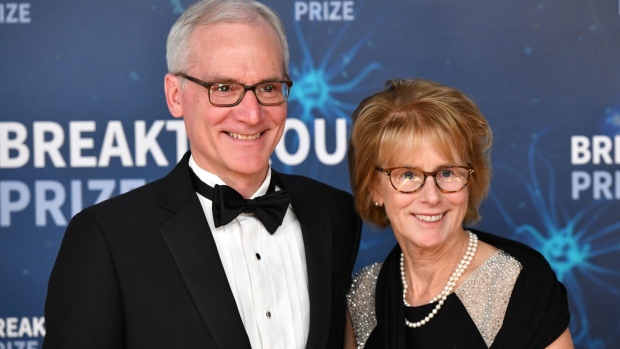Aug 31, 2023
Outgoing Stanford President Retracts Two Studies From Science After Review
, Bloomberg News

(Bloomberg) -- Outgoing Stanford University President Marc Tessier-Lavigne retracted two papers from the journal Science Thursday, just as the former high-flying neuroscientist steps down from his post after questions arose about his earlier research.
The flawed brain studies were published in February and March of 2001, when Tessier-Lavigne was a rising star at the University of California, San Francisco. They’ve been cited hundreds of times by other scientists since then, a sign of acceptance as important scholarship. They’re among five he pledged to retract or correct when an investigation initiated by the university’s board released its findings in July.
Spurred by a series of articles in the Stanford Daily student newspaper, the board scrutinized a wide swath of research that Tessier-Lavigne oversaw, including one study published when he was a top research executive at Genentech Inc., just before the biotech was fully purchased by Roche Holding AG in 2009. While the review found evidence of “manipulation of research data” by other authors in some of the studies reviewed, there was no evidence he had falsified results.
In brief retraction notices for the two Science papers, Tessier-Lavigne said that in 2015 he proposed corrections to each that weren’t published “because of an error on the part of the journal.” However, after the review found evidence of manipulated data, he decided to retract them, the notices said.
Science acknowledged that it discussed and agreed to corrections to the articles, according to an email from a spokesperson. The journal can’t determine why the corrections weren’t posted and takes “full responsibility for this mistake,” the email said. In a July statement, Tessier-Lavigne said Stanford’s panel confirmed that he didn’t know about the data manipulation at the time the papers were published and didn’t believe until recently that the issues affected the results.
Read More: Stanford Student Uncovered Scandal That Took Down a President
Two of three co-authors signed the retraction notice with Tessier-Lavigne for the March 2001 study. Neuroscientist Elke Stein, the lead author on both studies and the only co-author on the February 2001 paper, disagreed with the decision to retract, according to the notices.
When he announced his Aug. 31 resignation in July, Tessier-Lavigne also pledged to correct a high-profile 2009 Nature paper, written when he was a top researcher at Genentech, that proposed a new model for how brain cells might die in Alzheimer’s disease. The study burnished the neuroscientist’s reputation shortly before he was tapped to become president of Rockefeller University in New York, where he served until coming to Stanford in 2016.
Even before the 2009 study came out and in the years immediately afterwards, other researchers at Genentech had difficulty reproducing certain results in the Nature paper, according to a review released by Roche this year. Three years after the study, Roche terminated an Alzheimer’s drug discovery program that was based on the finding. For his part, Tessier-Lavigne later walked back some of the Nature paper’s claims in studies he published in other journals, without directly correcting the original 2009 paper.
Exercise Caution
While rejecting allegations of fraud, the Stanford investigation found “multiple problems” in that study. Tessier-Lavigne “failed to decisively and forthrightly correct mistakes in the scientific record” on multiple occasions, the review found.
A note attached to the 2009 Nature paper says it’s under investigation by the journal’s editors and caution should be exercised when using its results. In an email, Tessier-Lavigne said he’s working with Nature on a correction for that paper. He’s also working on correcting one other paper and retracting yet another. Still, four of five major findings from the 2009 paper have “withstood the test of time,” he said.
Tessier-Lavigne came to Stanford after decades as a leader in the field of brain and spinal-cord research. His work has focused on the causes and treatment of degenerative diseases such as Alzheimer’s and Parkinson’s disease, as well as developing therapies for spinal-cord injuries. He’s a co-founder of Denali Therapeutics Inc., which develops treatments for neurodegenerative diseases, and a board member at Regeneron Pharmaceuticals Inc. He will remain at Stanford as a professor.
A special committee of Stanford’s board began the review of allegations of research misconduct in December. When he announced his resignation in July, Tessier-Lavigne said he should have “been more diligent when seeking corrections, and I regret that I was not.”
“The panel’s review also identified instances of manipulation of research data by others in my lab,” he said then. “Although I was unaware of these issues, I want to be clear that I take responsibility for the work of my lab members.”
--With assistance from Janet Lorin.
©2023 Bloomberg L.P.


